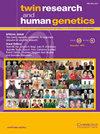Transcriptomic Differences Between Monozygotic Adolescent Twins Discordant For Metabolic Syndrome Following Weight Loss: A Case Study
IF 1
4区 医学
Q4 GENETICS & HEREDITY
引用次数: 0
Abstract
Abstract This case reports peripheral blood mononuclear cell (PBMC) transcriptomic changes in a pair of male monozygotic pediatric twins with metabolic syndrome (MetS) undertaking assisted weight loss. These 14-year-old boys presented with similar baseline biochemistry and body composition. After a 16-week weight-loss intervention, percent body weight loss was similar (Twin A 12%, and Twin B 13%). MetS resolved in Twin A but Twin B maintained elevated triglycerides after weight loss. Analysis of the PBMC transcriptome before and after weight loss revealed very different changes in gene expression including differences in the direction of expression of genes related to immune cell activation. 48.7% of genes that were downregulated in Twin A were upregulated in Twin B. This case highlights a novel approach to report the influence of chronic low-grade inflammation and metabolic dysfunction on the PBMC transcriptome. It explores whether expression of genes related to immune functions may underlie the differences in response to weight loss or whether transcriptomic alterations in immune cells may precede more traditional biomarkers of chronic pro-inflammation. These monozygotic twins present an example of divergence of phenotypic outcomes despite identical genetic background and similar treatment response.减肥后代谢综合征不一致的同卵青春期双胞胎转录组差异:一个案例研究
摘要:本病例报告了一对患有代谢综合征(MetS)的男性同卵儿科双胞胎在辅助减肥过程中外周血单核细胞(PBMC)转录组学的变化。这些14岁的男孩表现出相似的基线生化和身体成分。经过16周的减肥干预,体重减少的百分比相似(双胞胎a 12%,双胞胎B 13%)。双胞胎A的MetS得到了解决,但双胞胎B在减肥后仍保持甘油三酯升高。对减肥前后PBMC转录组的分析显示,基因表达的变化非常不同,包括与免疫细胞激活相关的基因表达方向的差异。在双胞胎A中下调的基因中有48.7%在双胞胎b中上调。该病例强调了一种报告慢性低度炎症和代谢功能障碍对PBMC转录组影响的新方法。它探讨了与免疫功能相关的基因表达是否可能是体重减轻反应差异的基础,或者免疫细胞的转录组改变是否可能先于更传统的慢性促炎症生物标志物。尽管相同的遗传背景和相似的治疗反应,这些同卵双胞胎呈现出表型结果差异的例子。
本文章由计算机程序翻译,如有差异,请以英文原文为准。
求助全文
约1分钟内获得全文
求助全文
来源期刊

Twin Research and Human Genetics
医学-妇产科学
CiteScore
1.50
自引率
11.10%
发文量
37
审稿时长
6-12 weeks
期刊介绍:
Twin Research and Human Genetics is the official journal of the International Society for Twin Studies. Twin Research and Human Genetics covers all areas of human genetics with an emphasis on twin studies, genetic epidemiology, psychiatric and behavioral genetics, and research on multiple births in the fields of epidemiology, genetics, endocrinology, fetal pathology, obstetrics and pediatrics.
Through Twin Research and Human Genetics the society aims to publish the latest research developments in twin studies throughout the world.
 求助内容:
求助内容: 应助结果提醒方式:
应助结果提醒方式:


